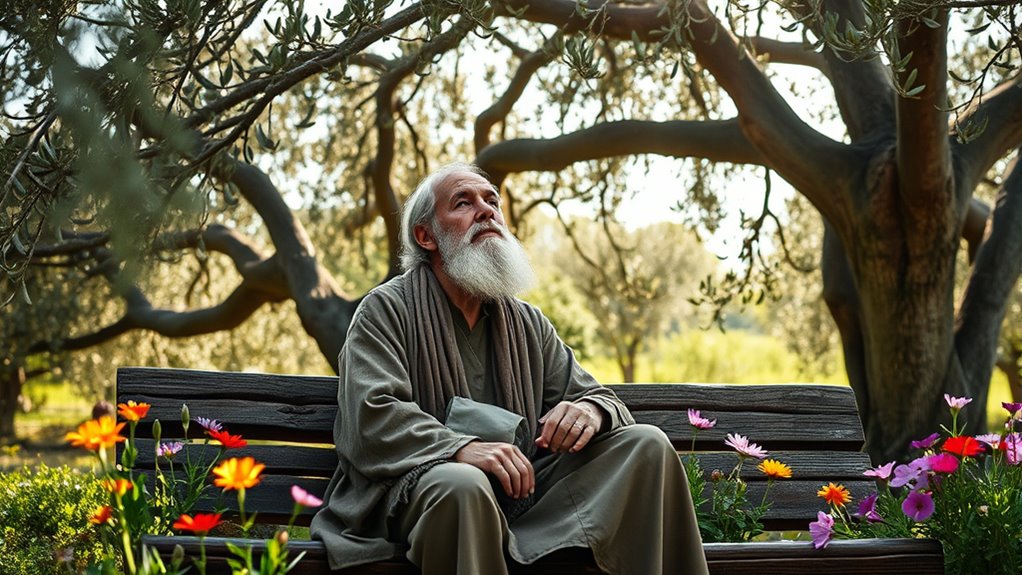Epictetus teaches that shifting your perspective is key to mastering love and life. By recognizing what’s within your control—your reactions, attitude, and choices—you can navigate challenges with calmness and resilience. External events may be beyond your influence, but your response isn’t. Embracing mindfulness, gratitude, and reflection allows you to see situations differently, fostering greater compassion and inner peace. Continue exploring his insights, and you’ll discover practical ways to transform your outlook and live more intentionally.
Key Takeaways
- Epictetus teaches that controlling perceptions shapes how we experience love and life, emphasizing internal mastery over external events.
- Adopting a mindful perspective allows us to accept circumstances beyond our control, fostering resilience and emotional balance.
- By reframing challenges as opportunities for growth, we develop compassion and deepen our understanding of love and life’s complexities.
- Cultivating gratitude and clarity through reflection enhances our ability to maintain a peaceful, virtuous mindset in all relationships.
- Recognizing the power of perception empowers us to choose responses aligned with virtue, leading to fulfillment and authentic connections.
Understanding Epictetus: A Brief Overview

Have you ever wondered what makes Epictetus stand out among Stoic philosophers? His teachings emphasize the importance of mindful meditation, helping you stay aware of your thoughts and reactions. Epictetus believed that mastering your mind leads to ethical integrity, guiding your actions with virtue and honesty. Unlike others, he focused on practical advice, encouraging you to reflect daily and maintain perspective during challenges. His life story, from slavery to a respected teacher, underscores resilience and the power of inner discipline. By practicing mindful meditation, you learn to detach from external events and focus on your internal responses. This approach fosters a life rooted in integrity, making Epictetus’s teachings both timeless and profoundly relevant today. Developing a clear understanding of your values can help you apply his principles more effectively in daily life. Cultivating mental clarity and health through consistent reflection can further enhance your ability to stay grounded and true to yourself. Recognizing the importance of perspective in navigating life’s difficulties can deepen your practice of Stoic philosophy and lead to greater personal resilience. As the cost of payment data breaches continues to rise, implementing secure payment practices underscores the importance of internal discipline and vigilance in safeguarding what matters most, including personal and financial integrity. Incorporating preppy dog names into your life can also serve as a reminder of the importance of style and personality in our everyday interactions.
The Core Principles of Stoic Philosophy

You can embrace Stoic philosophy by focusing on virtue as your moral compass, guiding your actions and choices. Recognize what’s within your control and accept what isn’t to maintain inner peace. Use reason to manage your emotions, ensuring they align with your values and help you stay resilient. Incorporating best anime movies can also offer valuable lessons in perseverance and perspective. Additionally, understanding the benefits of airless paint sprayers highlights the importance of efficiency and quality in projects, which can be applied to cultivating patience and skill in personal growth. Developing interpretation skills can help you better understand and learn from your experiences, including dreams and challenges. By cultivating cultural intelligence, you can better navigate life’s challenges with a steady mind and compassionate heart.
Virtue as a Guide
Virtue serves as the essential compass in Stoic philosophy, guiding you toward moral excellence regardless of external circumstances. This aligns with virtue ethics, emphasizing the development of moral character as the foundation of a good life. When you focus on cultivating virtues like wisdom, courage, justice, and temperance, you create a steady internal compass. Your actions become aligned with moral integrity, even when faced with challenges or setbacks. By prioritizing virtue as your guide, you learn to respond thoughtfully rather than react impulsively. This focus on moral character helps you stay grounded, resilient, and true to your principles. Additionally, the practice of self-awareness supports your ability to assess and refine your virtues continuously. Cultivating a mindful perspective allows you to see situations more clearly and respond in accordance with your virtues. Developing moral clarity further enhances your capacity to distinguish right from wrong in complex scenarios. Recognizing the importance of internal harmony can also strengthen your commitment to living virtuously amid external chaos. To deepen your understanding, studying ethical theories can provide valuable insights into moral decision-making and personal growth. Ultimately, virtue becomes not just a goal but a constant guide, shaping how you love, live, and navigate the world.
Control and Acceptance
At the heart of Stoic philosophy lies the understanding that while we can’t control external events, we can control our responses and attitudes. Embracing this idea allows you to practice mindful acceptance, acknowledging reality without resistance. By cultivating emotional detachment, you prevent negative feelings from clouding your judgment. Recognize what’s within your power and let go of what you aren’t able to influence. This balance empowers you to face challenges calmly and purposefully. Consider the table below:
| Control | Acceptance |
|---|---|
| Your reactions | External circumstances |
| Your choices | Outcomes beyond your influence |
| Your attitude | Unchangeable events |
Focusing on what you can control fosters resilience. Accepting what you cannot change reduces frustration, helping you respond with clarity and strength. Understanding emotional detachment can further aid in maintaining this perspective during difficult times. Cultivating a perspective aligned with personal responsibility supports a balanced and resilient mindset. Additionally, recognizing the role of water in therapy and relaxation can inspire a sense of calm and clarity in navigating life’s challenges. Incorporating mindful hydration practices can also enhance emotional regulation and mental clarity. Being aware of signs of spoilage in lemon juice can serve as a metaphor for recognizing what to discard in life to maintain emotional health.
Emotions and Reason
Emotions often feel overwhelming because they seem to arise spontaneously, but Stoic philosophy teaches that reason should govern how we respond to them. Developing emotional awareness helps you recognize your feelings without being controlled by them. Rational thinking acts as a guide, allowing you to pause and evaluate your emotional reactions objectively. Instead of reacting impulsively, you can choose a balanced response rooted in logic and virtue. By practicing this discipline, you learn to differentiate between what is within your control and what isn’t, fostering inner peace. Understanding the emotional impact of music in trailers can also help you manage your reactions to powerful stimuli, enabling a more mindful approach to emotional experiences. Cultivating mindfulness techniques enhances your ability to observe emotions without immediate judgment, supporting emotional regulation. Mastering the relationship between emotions and reason empowers you to navigate love and life with clarity, resilience, and a steady mind, just as Epictetus advised.
The Role of Perception in Shaping Reality

Perception acts as the lens through which you interpret and make sense of the world around you. It plays a pivotal role in perception shaping your experience, influencing how you view events, people, and yourself. Your perceptions don’t just reflect reality; they actively participate in reality construction. By framing situations in certain ways, you decide whether they seem positive or negative. This means your mindset and beliefs shape your reality more than external facts alone. Epictetus reminds you that changing your perception can transform your experience, empowering you to see obstacles as opportunities. When you adjust your perspective, you influence how life unfolds. Ultimately, your perception isn’t a passive mirror but an active force that molds your understanding of the world and your place in it. Recognizing the importance of perception and its role in self-awareness can help you develop a mindset that fosters growth and resilience. Understanding the role of cognitive biases can further enhance your ability to interpret situations more accurately and fairly. Additionally, ancient Egyptian wisdom often emphasizes the importance of truth and integrity, reminding us that clarity of perception is essential for genuine understanding.
Differentiating Between What We Can and Cannot Control

Understanding what you can and cannot control is essential for maintaining peace of mind and focusing your energy effectively. When you accept that external validation isn’t within your power, you cultivate emotional detachment from others’ opinions. This shift helps you avoid unnecessary stress and frustration. Recognize that your reactions, choices, and attitudes are within your control, while others’ actions and circumstances are not. By focusing on what you can change—your mindset and responses—you free yourself from the cycle of frustration. Epictetus teaches us that our peace depends on this clear boundary. When you differentiate between what’s within your control and what isn’t, you develop resilience and clarity, enabling you to navigate love and life with greater perspective and less emotional turmoil.
Cultivating Inner Resilience Through Perspective

When you face challenges, try to see them as opportunities to grow rather than barriers. Shifting your focus honestly helps you respond with resilience instead of frustration. Embracing difficulties positively builds your inner strength and perspective.
Embrace Challenges Positively
Challenges often catch us off guard, but viewing them through a positive lens can transform obstacles into opportunities for growth. By practicing mindful acceptance, you acknowledge difficulties without resistance, creating space for clarity and resilience. Instead of dwelling on setbacks, adopt an optimistic outlook that focuses on what you can learn and how you can adapt. This mindset helps you stay grounded and proactive, turning adversity into a catalyst for personal development. Embracing challenges positively doesn’t mean ignoring pain or discomfort; it means recognizing their role in shaping your strength. When you approach obstacles with openness and acceptance, you empower yourself to persevere and grow, transforming struggles into valuable lessons on your journey.
Shift Focus Honestly
Shifting your focus honestly requires you to look at situations with clarity and sincerity, rather than distortion or wishful thinking. When you approach life this way, you foster mindful communication, which helps you listen deeply and respond thoughtfully. Instead of blaming others or dwelling on negatives, you choose to see challenges as opportunities for creative problem solving. This shift enables you to avoid emotional reactions rooted in misunderstanding and instead approach issues with a calm, open mind. By honestly evaluating your circumstances, you build inner resilience, making setbacks feel less overwhelming. Ultimately, shifting your focus in this way strengthens your perspective, helping you navigate love and life with greater patience, clarity, and strength.
Applying Stoic Wisdom to Romantic Relationships

Applying Stoic wisdom to romantic relationships involves mastering your perceptions and reactions rather than trying to control others. Focus on mindful communication, listening carefully, and responding thoughtfully rather than reacting impulsively. By practicing emotional independence, you avoid becoming overly dependent on your partner’s actions or opinions, fostering a balanced mindset. Recognize what’s within your control—your attitudes, responses, and perceptions—and accept what isn’t. This shift allows you to approach conflicts with calmness and clarity, reducing unnecessary suffering. Emphasize understanding and patience, valuing your own inner stability above external circumstances. When you cultivate this perspective, you build a resilient relationship rooted in mutual respect, self-awareness, and emotional maturity. This Stoic approach encourages growth and harmony in love.
Navigating Life’S Challenges With Calm and Clarity

When challenges arise, you can maintain your composure by embracing inner calm and choosing your perspective wisely. Shifting how you view setbacks helps you respond thoughtfully rather than react impulsively. Building emotional resilience then allows you to face difficulties with clarity and strength.
Embrace Inner Calm
Finding inner calm amid life’s chaos begins with mastering your perspective. To do this, start with mindfulness meditation—taking a few minutes daily to focus on your breath helps ground you in the present moment. This practice quiets mental noise and creates space for clarity. Additionally, gratitude journaling shifts your focus from stress to appreciation, fostering a positive outlook that enhances emotional resilience. When challenges arise, these tools remind you that calmness is a choice, not a circumstance. By consistently practicing mindfulness and gratitude, you develop an inner steadiness that allows you to navigate difficulties with patience and clarity. Embracing this calmness empowers you to respond thoughtfully, rather than react impulsively, strengthening your ability to face life’s ups and downs with resilience.
Shift Perspective Strategically
Mastering your inner calm sets the stage for shifting your perspective during challenging moments. When you practice mindful storytelling, you can reframe setbacks as opportunities for growth. Use perspective anchors—familiar values or memories—to ground yourself amid chaos. To shift strategically:
- Identify the core emotion driving your reaction.
- Pause and breathe to create space for clarity.
- Reframe the situation through a different lens or perspective.
- Anchor your thoughts to a positive or neutral perspective, maintaining calmness.
This approach helps you navigate difficulties with clarity and resilience. By consciously choosing how to interpret events, you become less reactive and more intentional. Over time, this strategic perspective shifting empowers you to handle life’s challenges with steadiness and insight.
Cultivate Emotional Resilience
Cultivating emotional resilience is essential for steering life’s inevitable challenges with calm and clarity. You can build this resilience through practices like mindful journaling, which helps you process emotions and gain perspective. Regularly writing down your thoughts allows you to observe patterns and develop emotional regulation skills. When you face setbacks or stress, pause, breathe, and reflect on what’s within your control. This mindful approach reduces reactivity and enhances your ability to respond thoughtfully. Over time, you’ll strengthen your capacity to stay centered amid chaos, making it easier to navigate love and life’s ups and downs. Remember, resilience isn’t about avoiding emotions but managing them wisely, empowering you to face challenges with steadiness and clear-headedness.
Developing Compassion and Empathy via Perspective

Understanding others’ experiences is essential for developing compassion and empathy, and perspective plays a crucial role in this process. When you broaden your view, you can better recognize the struggles and emotions that shape others’ actions. To enhance empathy development and compassion cultivation, consider these steps:
- Reflect on situations from the other person’s point of view.
- Question your assumptions about their motives or feelings.
- Recognize shared human vulnerabilities and common desires.
- Practice active listening to truly understand their narrative.
Practical Techniques for Shifting Your Viewpoint

Practicing specific techniques can make shifting your perspective more natural and effective. One powerful method is mindful journaling, where you regularly write about your thoughts and feelings, observing them without judgment. This process helps you identify patterns and gain clarity, making it easier to see situations from different angles. Gratitude exercises also shift your focus from what’s lacking to what’s present, fostering a more positive outlook. By listing things you’re grateful for daily, you reframe your mindset and cultivate appreciation. Both techniques train your mind to approach challenges and relationships with openness and resilience. Over time, these practices become habits that support a balanced perspective, aligning with Epictetus’s teachings on controlling your mind and embracing life’s realities.
Living a Fulfilled Life by Embracing Epictetus’s Teachings

Living a fulfilled life becomes possible when you embrace Epictetus’s teachings on focusing your energy on what you can control and accepting what you cannot. To deepen this understanding, try these practices:
- Engage in mindful journaling daily to reflect on your reactions and distinctions between controllables and uncontrollables.
- Develop a gratitude practice to shift focus toward appreciating what’s present, reinforcing acceptance.
- Practice voluntary discomfort to build resilience and adaptability, aligning with Stoic principles.
- Regularly review your values and goals, ensuring they remain aligned with your core beliefs and passions.
Frequently Asked Questions
How Can Epictetus’S Teachings Be Applied in Modern Daily Life?
You can apply these teachings in your daily life through mindful acceptance of what you can’t control and focusing on your responses. Incorporate daily reflection to evaluate your thoughts and actions, helping you stay centered. Embrace challenges as opportunities for growth, and remember that your perspective shapes your experience. By practicing these principles, you’ll find greater peace and resilience amidst life’s ups and downs.
What Are Common Misconceptions About Stoic Philosophy?
Many people believe Stoic philosophy promotes emotional suppression, but that’s a misconception. Its misunderstood virtues focus on emotional resilience and rationality, not indifference. These misconceptions often originate from oversimplified interpretations or misrepresentations in popular culture. You might think Stoics avoid feelings altogether, but they aim to understand and manage emotions wisely. Embracing this philosophy helps you develop inner strength, not suppress your humanity or passions.
How Does Perspective Influence Emotional Well-Being?
Imagine your mind as a garden; perspective is the gardener’s hand shaping what grows. Your mindset shifts can foster emotional resilience, helping you weather storms and enjoy sunny days. When you see challenges differently, you build strength and stability. This mental rewiring influences your emotional well-being, making it easier to stay balanced and optimistic amid life’s ups and downs. Your perspective truly determines how peaceful or turbulent your inner world becomes.
Can Stoic Principles Improve Relationship Conflict Resolution?
You can improve relationship conflict resolution by practicing stoic principles, which encourage emotional detachment and patience cultivation. By maintaining emotional control, you avoid impulsive reactions that escalate conflicts. Cultivating patience helps you listen more openly and respond thoughtfully, fostering understanding. These strategies allow you to navigate disagreements calmly, build stronger bonds, and develop resilience, ultimately leading to healthier and more harmonious relationships.
What Are Simple Practices to Cultivate Resilience?
To cultivate resilience, start with simple practices like mindful journaling and gratitude exercises. When you journal mindfully, you become aware of your thoughts and emotions, helping you respond calmly rather than react impulsively. Practicing gratitude shifts your focus to positive aspects of life, boosting your emotional strength. Incorporate these habits daily, and over time, you’ll find yourself better equipped to handle setbacks and bounce back with greater ease.
Conclusion
By embracing Epictetus’s teachings, you can master the art of perspective—turning life’s chaos into calm, much like a modern Zen master with a smartphone. Remember, your perception shapes your reality, so choose to see challenges as opportunities for growth. When you shift your viewpoint, you unfasten inner resilience and compassion, guiding you toward a more fulfilled life. In today’s fast-paced world, his timeless wisdom is your ultimate life hack.









